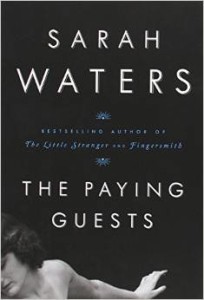 I came to this novel with a lot of good will from previous Sarah Waters’ novels—in particular The Night Watch, Fingersmith, and Tipping the Velvet. Waters is interested in how the “love that dare not speak its name” actually speaks its name quite loudly in the past—whether it’s during World War II, the 1890s or the 1860s. Her characters, often at the fringes of society, fall in love, double-cross each other, and challenge the norms of the worlds they live in, in all sorts of ways. The previous Waters’ novels that I’ve read pulled me in quickly and spit me out at the end—dazed but fascinated.
I came to this novel with a lot of good will from previous Sarah Waters’ novels—in particular The Night Watch, Fingersmith, and Tipping the Velvet. Waters is interested in how the “love that dare not speak its name” actually speaks its name quite loudly in the past—whether it’s during World War II, the 1890s or the 1860s. Her characters, often at the fringes of society, fall in love, double-cross each other, and challenge the norms of the worlds they live in, in all sorts of ways. The previous Waters’ novels that I’ve read pulled me in quickly and spit me out at the end—dazed but fascinated.
I was expecting more of the same with The Paying Guests but found myself strangely removed from the story of Frances Wray, her mother, and the paying guests of the title, Lilian and Leonard Barber. It’s London between the wars and Frances and her mother are what’s left of a well-to-do family in growing financial difficulty. Frances’s two brothers were killed in the war and when Frances’s father died not long after, he had all but squandered the family fortune on bad investments. Frances, who lived an independent life before and during the war, has had to return home to help her mother and she finds herself quite the “spinster.” She takes on the duties of the maid (who had to be let go), accompanies Mrs. Wray on her weekly routines, and tries to keep the household going with dwindling resources—all while regretting a choice she made earlier to break off a relationship with Christina, a woman she got to know during the war—a choice influenced by her mother’s discovery of that relationship.
When Frances and Mrs. Wray realize they need some form of income, they decide to rent out part of their house to lodgers—a young married couple from the middle classes. Leonard Barber works in insurance while Lilian decorates the new space with questionable taste. The first few weeks of cohabitation are as awkward and uncomfortable as you might expect—with the Wrays having to get used to strangers sharing common areas in their home and the Barbers trying to be on their best behavior—all even more complicated by class issues that Frances both notes and then tries to pretend she doesn’t.
However, as the days pass, Frances finds herself interacting more with Lilian and a tentative friendship is formed. However, as you might expect, this friendship develops into something else and you can hear the tragedy/catastrophe rumbling toward the pair like a distant train. There’s a lot of good stuff here—characters that seem infuriatingly real, a relationship that is pulled in multiple directions, exposing the tears in the fabric, and vivid descriptions of London society between the wars—it too being twisted and stretched in new ways. However, the whole time I was reading this, I kept feeling I should be more “into” it than I actually was and I’m struggling to understand/articulate why. The best I can say is the other novels I read with my gut but this one stayed solidly in my brain.
That said, Sarah Waters on an off day is still better than most. so don’t let my “It’s not you, it’s me” review keep you from reading this. However, if you haven’t read Fingersmith yet, do so as soon as possible!
